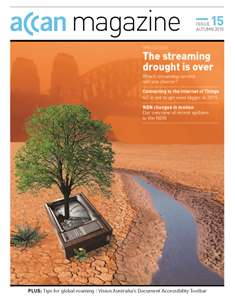Home
- Details
nbn™ has been tasked with providing broadband to all premises at affordable prices, regardless of the cost to provide these services. This will result in a number of services that will be loss making or non-commercial (i.e. fixed wireless and satellite services). The current arrangement is for nbn™ to fund these services through higher costs for services over other parts of its network. However, the Government wishes for the funding to be transparent and for all network providers to contribute to these services, not just nbn™.
The Bureau of Communications Research (BCR) recently consulted on potential alternative funding arrangements for these non-commercial services. They posed a number of questions about how these services could be funded, to which ACCAN provided feedback. Our submission focused on four areas:
-
- concern over the affordability of services;
- equity of services between consumers in fixed wireless and satellite areas and those in the fixed footprint;
- concern that the BCR was not focusing on consumers use of broadband; and
- queried how commercial services offered over the fixed wireless and satellite network will be treated.
- concern over the affordability of services;
Read more: Funding for fixed wireless and satellite services
- Details
Calling Number Display (CND) allows the people you call to see your telephone number displayed on the screen of their telephone. It applies to both mobile phones and landlines. If you don't have a silent line, unlisted number or have not blocked CND, the people you call will generally be able to see your number on their telephone screen.
The CND feature has important privacy implications because there may be times when consumers don't want their number identified to the person they are calling. Recently, the Calling Number Display Code was reviewed by the Communications Alliance. A number of changes were proposed, including downgrading the Code to a Guideline, which would not be enforceable by the Australian Communications and Media Authority (ACMA).
- Details

The ACCAN National Conference, Dollars and Bytes - Communications affordability now and tomorrow, was held from 1-2 September, 2015, at the Aerial UTS Function Centre in Sydney.
Affordability is one of our core objectives and was the focus of the Conference. Affordability of communications products is an issue that affects all consumers, from young people, to families and seniors.
Presentations and transcripts are now available and are linked below.
- Details
A new study launched today examines the barriers faced by many Deafblind consumers when accessing customer service call centres. The Assisted Access study by Able Australia, was funded through the ACCAN Grants Scheme and aimed to develop a model for Deafblind consumers to access their telco's customer service with ease and security.
Consumers who are Deafblind have both a significant hearing and vision loss. Current information and privacy practices usually require the customer to interact using their own voice – not a facilitator's – and therefore prevent these consumers from easy phone access to their telcos. Text based alternatives are often also inadequate when using specialised screen set ups and braille based systems.
Read more: Study proposes a new model for Deafblind access to telco services
- Details
The Australian Communications Consumer Action Network (ACCAN) has today launched the 2015 Apps For All Challenge which aims to find Australia's most accessible apps. After successfully launching last year, it's hoped that this year's competition will draw even more entries and awareness for apps that are accessible to all Australians.
The Apps For All Challenge is Australia's first and only competition that awards accessible mobile apps. The challenge is sponsored by Telstra and will award apps in four categories (see below).
- Details
In a submission on the Copyright Amendment (Online Infringement) Bill 2015, the Australian Communications Consumer Action Network (ACCAN) has called on the Government to remove ambiguity around Virtual Private Networks (VPN) and subject the scheme to a cost benefit analysis.
Online piracy is a significant issue in Australia which has been caused by a lack of access, delayed release dates and affordability of content. Giving consumers' choice will solve the worst of the piracy problem, so the introduction of streaming services such as Netflix, Presto and Stan is a positive step. The bill requires the blocking of websites which 'facilitate' copyright infringement. This may pick up a number of VPN services which allow Australians to buy content overseas.
Read more: Website blocking bill should address legality of VPNs to reduce piracy
- Details
The Copyright Amendment (Online Infringement) Bill 2015 allows copyright holders to apply to court to have piracy websites blocked by Internet Service Providers (ISPs). The power can even be used to block websites which 'facilitate' infringement. Many Australian consumers use Virtual Private Networks (VPN) to by-pass geo-blocking restrictions and buy content from overseas. Copyright holders believe this practice breaches their rights under the Copyright Act and may use this new blocking power against VPN websites.
ACCAN believes consumers should have the freedom to choose where they purchase content. Improved choice will also address some of the problems around access, delayed release dates and affordability which fuel piracy.
- Details
The Australian Communications Consumer Action Network (ACCAN) congratulates Netflix on its introduction of Audio Description for its original programming. In a blog post, the streaming service announced that it will offer Audio Description on select titles, beginning with its new series, Marvel's Daredevil. Audio Description will also be rolled out to previous seasons of its original programs including House of Cards, Orange is the New Black, Unbreakable Kimmy Schmidt and Marco Polo.
Netflix's announcement overnight follows the launch of the ABC's Audio Description trial on its iview catch-up service which launched yesterday. Audio Description is additional verbal narration that describes visual elements shown on screen during pauses in dialogue. It can describe elements such as scenes, costumes and actions.
Read more: ACCAN congratulates Netflix on introducing Audio Description
- Details
The Australian Communications Consumer Action Network (ACCAN) would like to congratulate the ABC on the launch of its ABC iview Audio Description trial. Audio Description is additional verbal narration that describes visual elements shown on screen during pauses in dialogue. It can describe elements such as scenes, costumes and actions.
Consumers who are blind or have a vision impairment will be able to access approximately 14 hours of Audio Described content each week. The trial starts today and will run for 15 months. The content will also be useful to consumers with a learning disability as it will enhance their understanding of what is happening on screen.
The Audio Described content is available on the ABC iview iOS app and will eventually be rolled out to the Android app and the iview website as well. This is the first time a streaming service has introduced Audio Described content in Australia.
Read more: ACCAN congratulates ABC on Audio Described iview content
- Details

Beginning 14 April 2015, the ABC will start trialling Audio Description on its iview online catch-up service. The trial will provide approximately 14 hours of audio described content each week and is expected to run for 15 months.
Audio Description is additional verbal narration that describes visual elements shown on screen during pauses in dialogue. It can describe elements such as scenes, costumes and actions.
Audio Description is important and useful for people with a vision impairment and people with a learning disability as it helps to enhance their understanding of what is happening on screen.
Read more: ABC iview Audio Description trial
Write comment (0 Comments)- Details

Download: ![]() ACCAN Magazine Issue 15 Autumn 2015.pdf1.47 MB (Note: reading order not acessible)
ACCAN Magazine Issue 15 Autumn 2015.pdf1.47 MB (Note: reading order not acessible)
Download accessible version: ![]() ACCAN Accessible Magazine - Autumn 2015.docx43.95
ACCAN Accessible Magazine - Autumn 2015.docx43.95
- Details
The recent Federal Court decision in the Dallas Buyers Club case is the first of its kind in Australia. The decision means that the internet service providers (ISPs) involved – iiNet and others – will now have to give the Dallas Buyers Club rights holder, Voltage Pictures, the contact information of account holders who allegedly downloaded a pirated copy of the film.
Once this information is handed over, Voltage Pictures is able to send account holders a letter about the activity they allege has happened. In this case the Federal Court is reviewing all letters Voltage Pictures will be sending to account holders to make sure there is no 'speculative invoicing'. This is a fancy name for a demand for money to be paid to the rights holder for pirating the film. These letters might say that the company will take you to court if you don't pay. Speculative invoicing has been used overseas in the US, Canada and UK to intimidate consumers into paying compensation for claims of illegal file sharing.
Read more: Online piracy and speculative invoicing
Write comment (0 Comments)